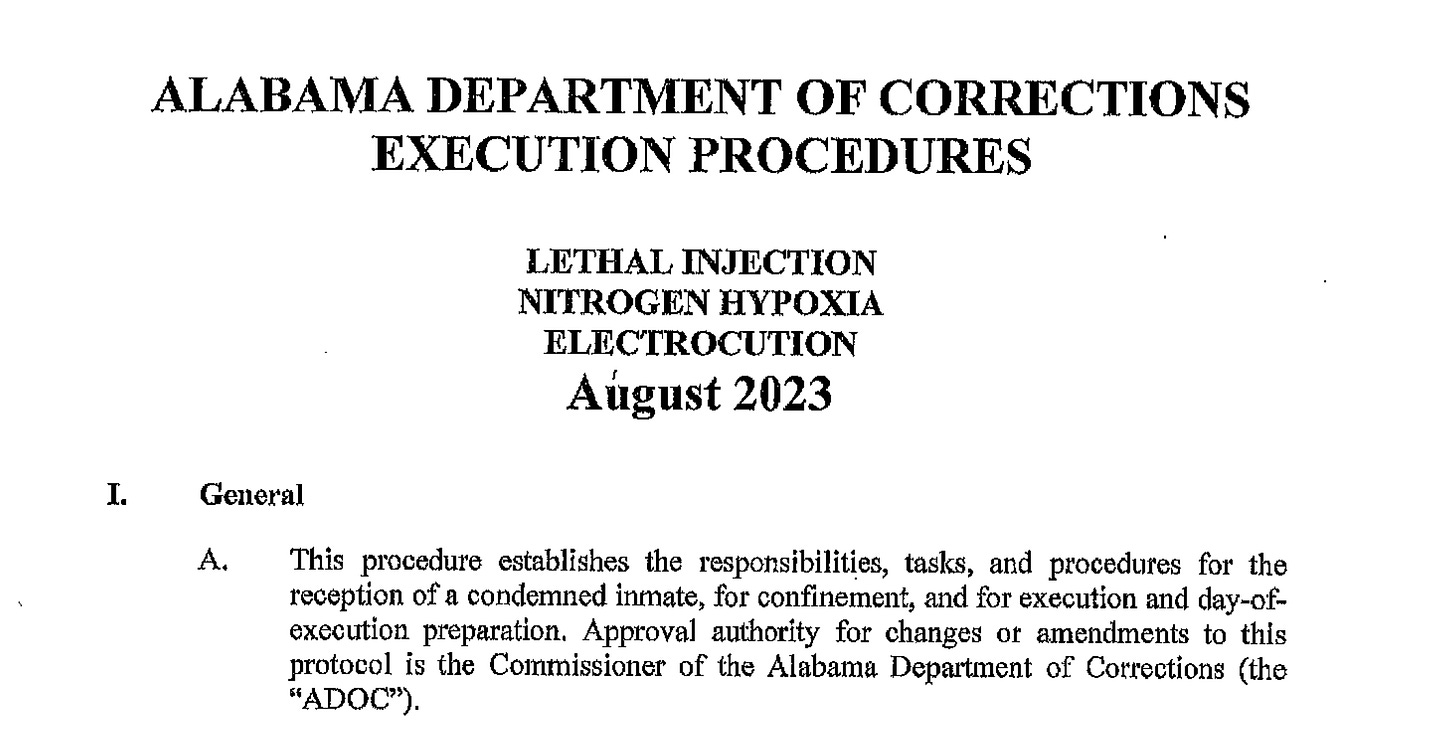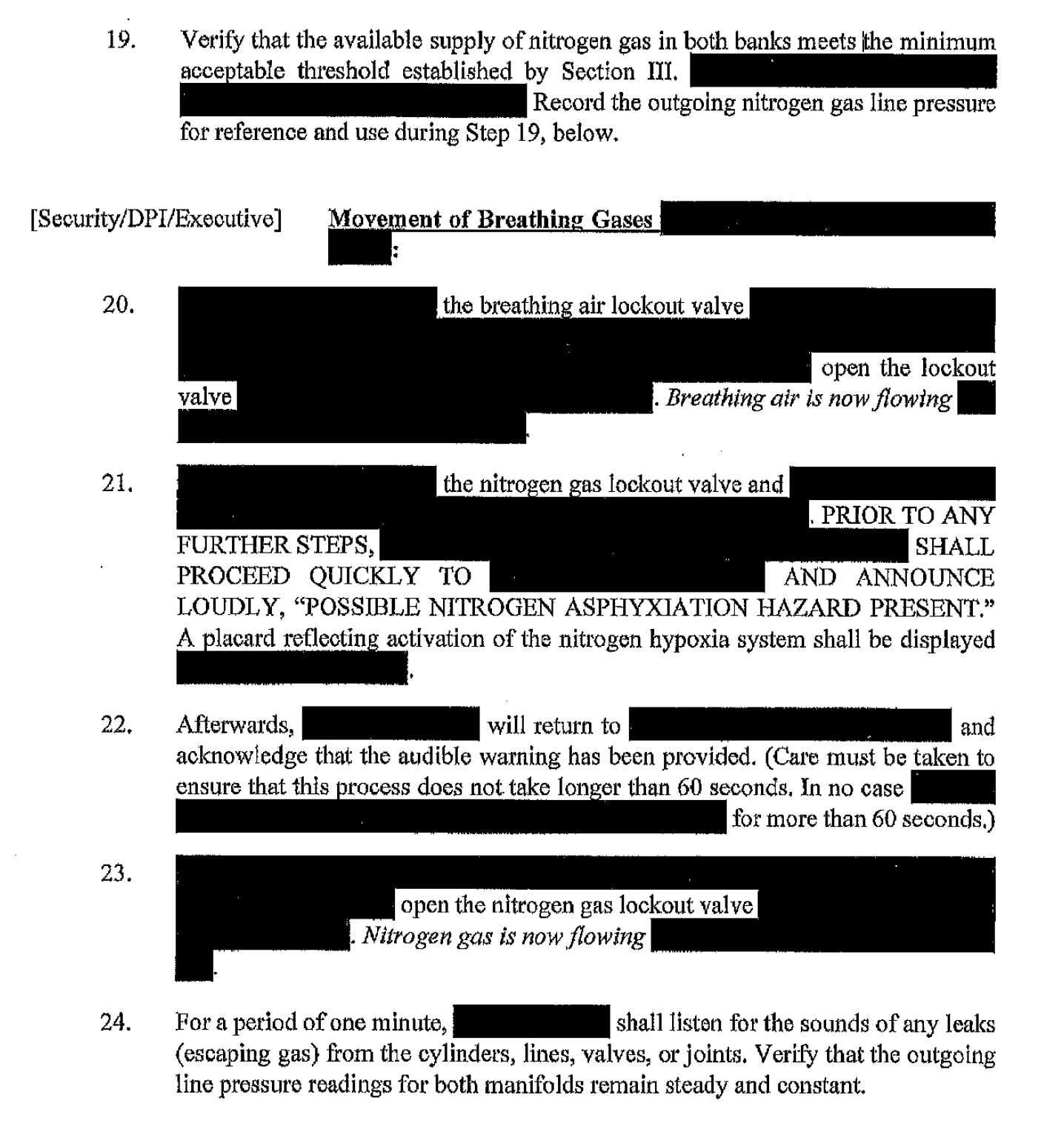Alabama Releases (Heavily Redacted) Lethal Gas Execution Protocol
Prosecutors Asked the Alabama Supreme Court to Set an Execution Date for Kenneth Smith, and Asked a Federal Court to Dismiss Smith's Lawsuit Seeking to Bar His Execution by Lethal Injection
Five years and three botched lethal injections after the Alabama legislature first authorized the state to put prisoners to death by lethal gas, Alabama has released its nitrogen hypoxia execution procedures.
Alabama prosecutors filed the heavily redacted protocol in federal court on August 25, 2023, as part of a motion to dismiss a lawsuit by death-row prisoner Kenneth Smith that sought to bar the state from attempting a second time to execute him by lethal injection. Alabama Department of Corrections (ADOC) officials called off Smith’s scheduled execution on November 17, 2022 after execution personnel failed for more than an hour to establish an intravenous line to administer the lethal injection drugs.
Alabama released its new execution protocol on August 25, 2023. You can it read it at the link immediately below.
This excerpt from the protocol illustrates how heavily it is redacted.
Because of the redactions, it is impossible to determine with specificity how the lethal gas process will proceed. However, it appears that Alabama intends to administer the gas through a forced breathing tube attached to a mask on the prisoner’s faced while he or she is strapped on an execution gurney.
Under new requirements established by the U.S. Supreme Court in Bucklew v. Precythe in 2019, a death-sentenced prisoner is required to propose an available alternative method by which he or she may be executed before the court will review whether the initial method designated by the state is unconstitutionally cruel and unusual. Smith designated nitrogen hypoxia as the alternative to lethal injection and argued in his lawsuit that Alabama should be prohibited from executing him by any other means.
In its motion to dismiss Smith’s lawsuit, the Alabama Attorney General’s office wrote that ADOC “has determined that nitrogen hypoxia is an available means of execution and will be used in the execution of [Smith]. … Because no issue remains before this Court, this matter is moot … [and] should be dismissed for want of jurisdiction.” Smith has not yet responded to the motion.
Alabama prosecutors also filed a motion in the Alabama Supreme Court asking it to set a new execution date for Smith. “[T]he State is prepared to carry out Smith's execution by means of nitrogen hypoxia,” prosecutors wrote.
Three states, Oklahoma, Alabama, and Mississippi, authorize nitrogen hypoxia as an execution method. However, no state has conducted an execution using that method and, until last week, no state had developed a hypoxia protocol. Lethal injection is still Alabama’s default method of execution unless the prisoner designates lethal gas or the electric chair.
In 2018, Alabama execution personnel unsuccessfully attempted for 2 1/2 hours to set an intravenous line to execute Doyle Hamm. As the midnight expiration of his death warrant approached, ADOC called off the execution. Hamm, who was terminally ill with cranial and lymphatic cancer when Alabama sought to execute him, filed suit to bar the state from attempting a second execution. The parties reached a confidential settlement in which the state agreed it would not try to execute him again. Hamm died in prison in November 2021.
In 2022, Alabama attempted three lethal injection executions and botched all three. After an unexplained three-hour delay in which it failed at least 11 times before establishing an IV line through an apparent cut-down procedure, Alabama executed Joe Nathan James, Jr. on July 28, 2022. The human rights group, Reprieve, described it as the longest botched execution in U.S. history.
On September 22, execution team members also failed to set an IV line for the scheduled execution of Alan Miller before ADOC halted his execution attempt.
Then, on November 17, the state botched the attempted execution of Kenneth Smith.
The Death Penalty Policy Project (“DP3”) is a 501(c)(3) non-profit organization housed within the Phillips Black Inc. public interest legal practice. DP3 provides information, analysis, and critical commentary on capital punishment and the role the death penalty plays in mass incarceration in the United States.





